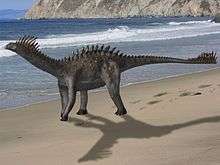Agustinia
| Agustinia Temporal range: Early Cretaceous, 108 Ma | |
|---|---|
| Scientific classification | |
| Kingdom: | Animalia |
| Phylum: | Chordata |
| Class: | Reptilia |
| Clade: | Dinosauria |
| Order: | Saurischia |
| Suborder: | †Sauropodomorpha |
| Clade: | †Neosauropoda |
| Clade: | †Macronaria |
| Clade: | †Somphospondyli |
| Family: | †Agustiniidae Bonaparte, 1999 |
| Genus: | †Agustinia Bonaparte, 1999 |
| Type species | |
| †Agustinia ligabuei Bonaparte, 1999 | |
Agustinia /ɑːɡəˈstɪniə/ is a genus of sauropod dinosaurs from the Early Cretaceous Period of South America. It contains the single species Agustinia ligabuei, a single specimen of which was recovered from the Lohan Cura Formation of Neuquen Province in Argentina, thought to date from the late Aptian to Albian stages of the Early Cretaceous Period, between 116 and 100 million years ago.
The name Agustinia honors the discoverer of the specimen, Agustin Martinelli. This dinosaur was originally named in a 1998 abstract written by famous Argentine paleontologist Jose Bonaparte. The original generic name was "Augustia", which, as it turned out, was already preoccupied by a beetle (see also: Megapnosaurus, Protognathosaurus). Bonaparte changed the name to Agustinia in a full paper published in 1999. There is one named species (A. ligabuei), which is named in honor of Dr. Giancarlo Ligabue, a philanthropist who provided financial support to the expedition which recovered the remains.
Description

Only fragmentary remains are known. These include fragments of vertebrae from the back, hips, and tail regions of the spinal column. Parts of the lower hind limb were also recovered: a fibula, tibia, and five metatarsals. A femur (thigh bone) was found at the site but was too fragmented to collect.
Agustinia ligabuei was well known for its distinctive supposed armor plates (osteoderms), initially interpreted as a series of wide, vertical spikes and plates down the center of its back, somewhat like the unrelated Stegosaurus. However, other researchers have doutbed these remains being osteoderms. [1] Further study of the poorly preserved fossil material showed that these "plates" were in fact more likely to be fragments of ribs and hip bones.[2]
Aside from the supposed armor, very little has been described of the anatomy of Agustinia. A fibula (lower leg bone) has been recovered that is about 3 feet (895 mm) long. When compared to the same bone in related dinosaurs, this indicates that Agustinia may have been about 50 feet (15 meters) long. However, the remains are incomplete and do not appear to have many distinctive characteristics which can be used to separate it from other sauropods. With the supposedly distinctive armor discredited, some authors have considered Agustinia a nomen dubium, based on remains not adequate to compare with related dinosaurs.[2]
Because of its supposedly unusual armor, Agustinia was originally assigned to its own family, Agustiniidae (Bonaparte, 1999). This family name has not come into wide acceptance. Agustinia is difficult to classify because of its fragmentary nature, and because it exhibits features of both diplodocoid and titanosaurian sauropods. What few distinctive features do exist in the only known specimen suggests it is a member of the clade Somphospondyli, but it is not possible to determine its relationships with any more accuracy beyond that.[2]
References
- ↑ D'Emic, M. D., Wilson, J. A. and Chaterjee, S. (2009). "The titanosaur (Dinosauria: Sauropoda) osteoderm record: review and first definitive specimen from India". Journal of Vertebrate Paleontology. 29: 165. doi:10.1671/039.029.0131.
- 1 2 3 Mannion, Philip D.; Upchurch, Paul; Barnes, Rosie N.; Mateus, Octávio (2013). "Osteology of the Late Jurassic Portuguese sauropod dinosaur Lusotitan atalaiensis (Macronaria) and the evolutionary history of basal titanosauriforms". Zoological Journal of the Linnean Society. 168: 98. doi:10.1111/zoj.12029.
Further reading
| Wikimedia Commons has media related to Agustinia. |
- Bonaparte, J.F. 1998. An armoured sauropod from the Aptian of northern Patagonia, Argentina. In: Tomida, Y., Rich, T. H. & Vickers-Rich, P. (Eds.). Second Symposium Gondwana Dinosaurs, 12–13 July 1998, Abstracts with Program. Tokyo: National Science Museum. Pg. 10.
- Bonaparte, J.F. 1999. An armoured sauropod from the Aptian of northern Patagonia, Argentina. In: Tomida, Y., Rich, T. H. & Vickers-Rich, P. (Eds.). Proceedings of the Second Gondwanan Dinosaur Symposium Tokyo: National Science Museum Monographs #15. Pp. 1–12.
- Upchurch, P., Barrett, P.M., & Dodson, P. 2004. Sauropoda. In: Weishampel, D.B., Dodson, P., & Osmolska, H. (Eds.) The Dinosauria (2nd Edition). Berkeley: University of California Press. Pp. 259–322.